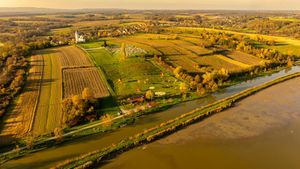The UK is facing alarming challenges relating to environmental concerns and biodiversity loss, as recent reports highlight both the immediate and long-term impacts affecting the country’s natural heritage. From dwindling bird populations to the degradation of natural habitats, the urgency for action has never been more pronounced.
According to multiple studies, the rich variety of species and ecosystems across the UK is experiencing unprecedented threats. Various factors contribute to this decline, including urbanization, agricultural expansion, pollution, and climate change. These issues not only jeopardize the natural landscapes but are also intertwined with the overall health of the planet.
One of the most concerning indicators of environmental distress is the drop in bird populations. The latest statistics reveal significant declines across various species. For example, certain once-common garden birds are now encountering difficulties maintaining their numbers. The Royal Society for the Protection of Birds (RSPB) data indicates severe declines, prompting questions about the sustainability of current conservation efforts.
This decline can be traced back to habitat destruction, with significant portions of land being converted for agricultural use and urban developments. Reports indicate over 30% of the UK’s original habitats have been lost. This affects not only birds but also the broader ecosystem, as many species rely on these habitats for food and breeding. The loss of flora and fauna disrupts ecological balances, leading to cascading effects.
Experts also cite the rise of invasive species as another contributing factor to biodiversity loss. Non-native plants and animals often outcompete native species for resources, potentially leading to the extinction of local flora and fauna. The government has taken note of this issue, with initiatives aimed at controlling invasive species and protecting native habitats being ramped up. Yet, the effectiveness of these measures remains ambiguous and calls for more consistent monitoring and action.
Another concerning factor is climate change, which is reshaping ecosystems across the UK. Changes in temperature and weather patterns are leading to shifts in species distributions. Some species are moving northwards or to higher altitudes, searching for suitable habitats. This can result in mismatches within ecosystems. For example, plants and the insects dependent on them may not adapt at the same rate, leading to food shortages for local wildlife.
The government’s response to these biodiversity losses has included promises of increased funding for environmental projects and the introduction of new policies aimed at protection and restoration efforts. Initiatives like the 25-Year Environment Plan point to a larger strategy to combat these environmental concerns. Yet, many environmentalists argue this is merely a stepping stone, and still insufficient to address immediate challenges.
Engaging local communities is seen as another layer of necessary intervention. Grassroots movements have begun organizing to protect local environments, often pushing for sustainable practices and conservation efforts from the ground up. These community initiatives can help raise awareness and propel decisions, impacting local policy-making and education around ecological preservation.
All of this poses the question: What role does public awareness and education play in combating these declines? Educational campaigns targeting schools and communities have started, hoping to inform citizens of the value of biodiversity and the actions they can take, both individually and collectively. The aim is to create ecological stewards, fostering respect for nature and encouraging sustainable practices.
While policy and governmental initiatives are certainly important, the reality is the fight against biodiversity loss also requires cultural shifts around how we view and interact with our environment. Changing consumer habits and increasing sustainable practices can potentially lead to meaningful improvements. Simple actions, like choosing local products or reducing plastic waste, contribute to larger ecological health.
Critics of current efforts argue there needs to be greater urgency and transparency from the government, demanding accountability with tangible results. The public seeks reassurance their concerns about environmental degradation are being taken seriously and acted upon effectively. The clear message from the scientific community is: time is of the essence, and there are no quick fixes to the biodiversity crisis.
Understanding the broader scope of these environmental concerns is key to generating collective action. It’s clear the challenges are not only ecological but also social and economic, extending their effects to public health and economic prosperity. Adopting more sustainable practices benefits both the environment and the population, intertwining their fates.
Another potential avenue for addressing these challenges involves increasing collaboration among governmental entities, NGOs, and local communities. Sharing knowledge, research, and resources can lead to innovative approaches to conservation. Efforts must also be directed toward leveraging technology to monitor biodiversity changes and gather data to inform decision-making.
Indeed, the stakes are high as the UK grapples with urgent environmental concerns. Losing species and degrading natural habitats doesn't only affect wildlife – it directly impacts the people who rely on these ecosystems for their needs. The ripple effects are far-reaching, touching all aspects of life. The restoration and preservation of biodiversity is not merely about conservation for its own sake; it’s fundamentally about ensuring a healthy planet for future generations.
Experts indicate there is potential for turning the tide but stress the need for immediate and collective action. By learning from the past and shifting toward sustainable models of living, the UK can improve its record on biodiversity loss. Conclusively, it requires everyone’s effort – from local communities to policymakers – to address these environmental concerns head-on and promote biodiversity for years to come.



